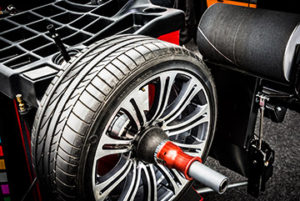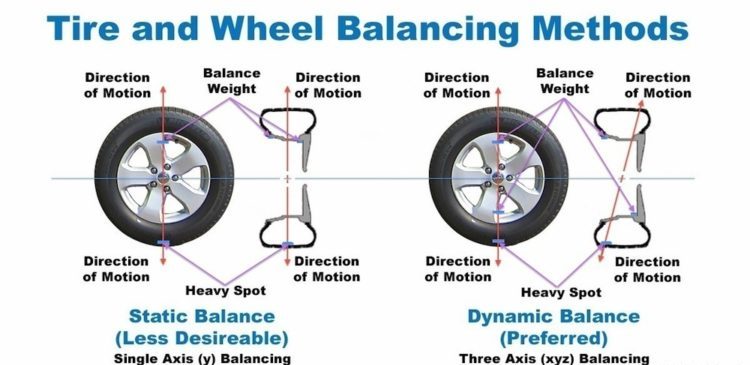Tire Balancing Near Me
Tire balancing may sound complicated, but it’s a fairly simple. It should not cost much to do either locally. If you’ve been told that your wheels are unbalanced or need to be balanced and you’re not sure what that means, don’t worry. Below is a simple guide to all your tire balancing questions. I will also share my experience with the shop that does tire balancing near me.
Find Tire Balancing Near Me
If you are in need of “Tire Balancing Near Me” or “Wheel Balancing Near Me”, the map below shows your best local options.
Where Can I Get My Tires Balanced Near Me?

Every time you have replacement tires put on your car you should insist that a balance check be done. If not done, it can begin doing damage to the car the second your tires hit the pavement. Even major retailers like Costco and WalMart can do balance checks from their auto service departments. Tire balancing is a simple enough procedure that you can technically do it yourself,. However, you need to have a balancing machine
If the balance check comes out negative, the actual process of “balancing” by affixing the counterweights can also be done at almost any garage or body shop. A balance check and the balancing itself are all considered part of the same procedure. You shouldn’t be charged extra if your tires are found to be out of balance.
How Much Does It Cost to Balance Tires Near Me?
Balancing tires is an incredibly routine repair. It is one of the cheapest repairs you can have done on your tires. As with any repair, the price will vary depending on where you go and how severe the problem is. You should never pay more than $75 to have your tires balanced. That’s slightly more then what the shop that does tire balancing near me charges.
Since this is a common procedure, it’s often thrown in for free along with other services. The cheapest way to balance your tires is to have it checked during rotation or alignment. Many shops will throw in a tire balancing free or discounted as part of a rotation.
Normally wheel balancing is offered free or a discounted price with the purchase and installation of brand new tires. This is especially true if you are buying directly from the manufacturer. Many tire shops and garages offer balancing warranties for tires (particularly brand new ones). While the warranty may cost you up front, it will be worth it to ensure the longevity of your tires.
What is Tire Balancing?
Perhaps a better question would be what is a tire imbalance?
When your tires are unbalanced, it means that the weight distribution across one or more of your tires is uneven. Uneven weight distribution affects the entire wheel (including the rim), and not just the tire itself. As the wheels turn, the weight from the body of the car should be spread relatively equally across the tire/wheel system. However, if there is an uneven amount of pressure on one part of the tire, it can cause the tire to rotate strangely. This, in turn, puts pressure on the wheel and on the axles.
Unbalanced tires can cause a whole host of problems. This includes causing the car to rattle and vibrate, suspension damage, and difficulty steering.
The first step in a tire balancing is just determining if there is an imbalance or not. Tire imbalances can often be the result of an improperly done alignment or rotation. Tire imbalances are sometimes fixed using a special counterweights to restore even weight distribution.
When Should I Balance My Wheels?
You should always do a balance check after a tire alignment or rotation. A good mechanic will automatically check to see that the tires are balanced after either of these procedures are done. A poorly done alignment or rotation can cause tires to be imbalanced. If a balance check is not done after either of these procedures, it could cause damage to your tires and suspension system.
Outside of these other routine procedures, I only advise one if you notice that your car is shaking or have difficulty steering. Tire balancing by itself is not seen as a routine maintenance service. If wheels are properly affixed to the vehicle, they should be perfectly balanced, and a check is not necessary.
In short, a balance should be automatically done after an alignment or a rotation. I also find it to be my standard ask when I’m installing four new or used tires on any vehicle.
What are the Benefits of Balancing Tires?
If the tires are imbalanced, it can put an unusual amount of pressure on one part of the tire over another. This, in turn, causes the tires to rotate abnormally and can cause damage to the wheels, axles, and suspension system.
Imbalanced wheels can also experience uneven tire wear, which can dramatically reduce the lifespan of your tires. In addition to all of this damage, imbalanced tires can cause the car to shake or vibrate, which can make it difficult to control the car on the road.
If you notice that your car is shaking, a big indicator that imbalanced tires are the cause is if the shaking becomes more violent as the car picks up speed. This is another potential danger of imbalanced wheels, as it can make highway driving difficult.
Damage to the axles and suspension system can cause steering difficulties. This can make the car unsafe to drive and often require repairs that are much more involved and expensive than a simple balance check. To avoid all of this, do a simple balance check and these catch problems before they even happen.
What’s the Difference Between Balancing and Alignment?
Tire alignments and tire balancing are often talked about together and most garages will do a tire balance after they’ve done an alignment. However, the two are technically different procedures.
Balancing is about making sure that the weight distribution is evenly spread across the tire, wheel, and axle. If tires are found to be imbalanced, this is usually corrected with specially designed counterweights. Alignments, on the other hand, become necessary when the tires are not sitting on the axle at the correct angle. If the wheels are tilted too far in toward the body of the car, or two far out away from the body of the car, they won’t rotate properly.
Misaligned wheels can quickly become unbalanced tires. This is why both repairs are often done as part of the same procedure. An improperly done tire alignment can result in imbalanced tires. Any good mechanic will automatically do a balance check after an alignment. If you are doing your own alignment, you should also do a balance check.
What’s the Difference Between Balancing and Rotation?
Balancing is something that should always be done after a tire rotation, but balancing is technically a separate repair.
Balancing is about ensuring that the weight on the tires is spread evenly across the entire tire, wheel, and suspension system. It is technically a repair, rather than a routine maintenance service. It’s usually external damage or other repairs that have been poorly executed that cause the tires to become imbalanced. Rotation, on the other hand, is a routine maintenance procedure that should be done regularly, about every 5,000 or so. When tires are rotated, the front and back tires are taken off the car and their positions are swapped out following a set rotation pattern optimized for your vehicle.
Rotations are necessary to ensure even tire wear. Uneven tire wear can cause tires to become imbalanced, and improperly done tire rotations causes tires to become imbalanced. These two repairs are typically done as part of the same procedure. If you rotate your own tires, you should also make sure you do a balance check.
Tire Balancing Near Me – Conclusion
It’s recommended that you do a balance check after every 6,000 miles of driving. This is also about when you should be getting a rotation as well. If you ensure that a balance check is done as part of your routine tire rotations, you eliminate the need for a separate balancing. In fact, a poorly done rotation can cause your wheels to become imbalanced, so a good mechanic will do a balance as part of rotation.
If you notice a shaking or vibrating in the body of the car or in the steering wheel this could be a sign that your tires are out of balance. If the shaking gets worse the faster the car drives, it’s even more likely its a balance issue. Balancing is a routine repair, and is one of the cheapest things you can have done to your wheels.
Prices will vary depending on where you go, but you should never pay more than $75 dollars including the purchase of a warranty.
